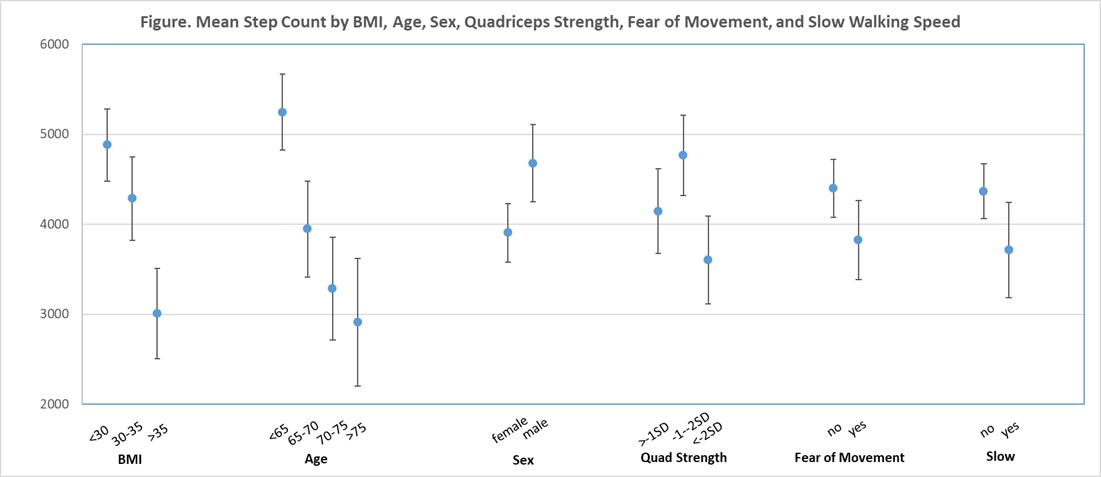Session Information
Session Type: Abstract Session
Session Time: 1:00PM-2:30PM
Background/Purpose: Low PA in persons with symptomatic knee osteoarthritis (OA) has often been attributed to pain. Evolving data suggest that TKA recipients do not increase PA after TKA despite satisfaction with pain relief in 72-86% of recipients. We sought to determine demographic, clinical, psychological, and physical performance characteristics that correlate with PA in TKA recipients.
Methods: We analyzed data from persons with OA scheduled for TKA undergoing eligibility assessment for the 4-center Knee Arthroplasty Activity Trial (KArAT). KArAT is designed to establish the efficacy of a behavioral intervention to increase walking-based PA post TKA. The baseline assessment includes body mass index (BMI), knee injury and osteoarthritis outcome score (KOOS) pain, Tampa Kinesiophobia Score ( >37 indicates fear of movement), quadriceps strength, and 40-meter timed walk. We defined very low muscle strength as two standard deviations (SD) below age/sex-stratified population norms. We defined low walking speed as < 20th percentile of age/sex-stratified population norms. We assessed the average daily step count and weekly moderate to vigorous physical activity (MVPA) using Actigraph. To reduce the impact of outliers, we restricted the sample to include those within 95% of step count distribution. We used generalized linear models to determine independent correlates of average daily step count and weekly MVPA considering demographic, clinical, psychological, and physical performance characteristics.
Results: The sample of 330 individuals had a mean age 65.8 (SD 8.0) years, KOOS pain 49.2 (SD 16.2), and BMI 31.3 (SD 6.1) kg/m2. On average, study participants walked 4,095 steps/day (SD 2163). The median time in MVPA was 54 min/week (IQR 24—117), 25% of the sample met criteria as slow walkers, and 35% had kinesiophobia. One third (31%) of the sample had quadricep strength < -2 SD of population norms. Independent correlates of step count included age, sex, BMI, slow walking speed, very low quadricep strength, and kinesiophobia (Figure). Pearson correlation between average daily step count (weekly MVPA) and KOOS pain was r=-0.03 (-0.04). Age and sex exhibited the strongest association with average step count: those >75 years walked a mean of 2501 steps/day compared to 4372 steps/day in those < 65; men walked about 700 steps (1/3 SD) more than women. Those with BMI >30 kg/m2 walked >1SD fewer steps compared to those with BMI< 25kg/m2 (2345 vs. 4950 steps/day). Slow walkers averaged 3263 steps/day; those with kinesiophobia 3224. Persons with very low quadricep strength averaged 2983 steps/day. Factors associated with lower MVPA time included older age, higher BMI, female sex, very low quadriceps strength, and slow walking speed.
Conclusion: In persons scheduled for TKA, age, BMI, quadricep strength, and walking speed correlated with objectively measured PA, while pain did not. Our findings reinforce the idea that pain relief afforded by TKA alone is unlikely to lead to improved PA. Motivational interventions focused on improving strength, reducing kinesiophobia and excess weight, and reinforcing the benefits of PA may contribute to improvements in PA uptake post TKA.
To cite this abstract in AMA style:
Losina E, Collins J, Safran-Norton C, Paskewicz M, Selzer F, Pavlesen S, Frier K, Dhani J, Lee D, Macdonald E, Streicher A, Ehrlich-Jones L, Segal N, Pellegrini C, Wellsandt E, Chang R, Katz J. Correlates of Physical Activity (PA) in Persons Undergoing Total Knee Arthroplasty (TKA): Does Pain Matter? [abstract]. Arthritis Rheumatol. 2024; 76 (suppl 9). https://acrabstracts.org/abstract/correlates-of-physical-activity-pa-in-persons-undergoing-total-knee-arthroplasty-tka-does-pain-matter/. Accessed .« Back to ACR Convergence 2024
ACR Meeting Abstracts - https://acrabstracts.org/abstract/correlates-of-physical-activity-pa-in-persons-undergoing-total-knee-arthroplasty-tka-does-pain-matter/

